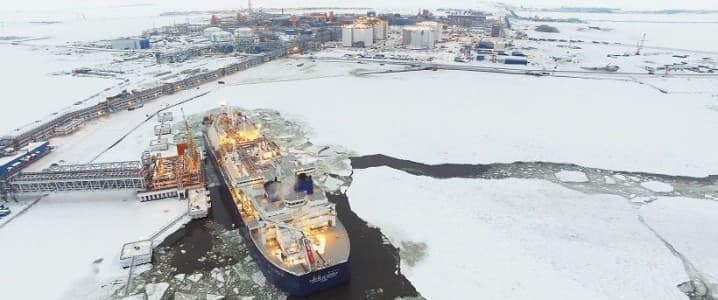Business
EU Struggles with Russian LNG Imports Despite Energy Goals

The European Union continues to import significant volumes of Russian liquefied natural gas (LNG) despite its stated commitment to phase out Russian energy sources. This situation raises questions about the bloc’s energy strategy and its ability to balance economic pressures with political commitments.
U.S. Energy Secretary Chris Wright recently indicated that the EU could transition away from Russian gas entirely within a year, potentially accelerating to just six months. Yet, the challenge lies in the pricing of LNG. Analysts highlight that Russian LNG remains markedly cheaper than its U.S. counterpart, complicating the EU’s efforts to reduce dependency on Russian energy.
In a troubling turn of events, imports of Russian LNG reached record levels in 2024, contradicting the EU’s intentions to impose sanctions on the Russian energy sector. According to data from Rystad Energy, the value of LNG imported from Russia between January and June 2024 was approximately €4.4 billion (around $5.16 billion), an increase from €3.47 billion in the same period of 2023. This uptick reflects the ongoing reliance on Russian gas, even as EU leaders seek to reduce these imports.
Despite attempts to curtail Russian LNG purchases, deliveries have remained steady. Discussions among EU member states earlier this year included proposals to eliminate long-term contracts without incurring penalties. Nevertheless, these efforts have not successfully curtailed imports. The EU’s total LNG imports surged by 25% in the first half of 2024, largely fueled by shipments from the United States, which accounted for 55% of total imports. Meanwhile, Russian LNG comprised 14% of the bloc’s imports.
This juxtaposition is striking, as the EU is now the largest market for U.S. LNG while simultaneously remaining a major purchaser of Russian liquefied gas. Notably, the EU received about two-thirds of U.S. LNG exports in the first eight months of 2025 and accounted for 51% of Russian LNG exports, surpassing imports to China.
The Centre for Research on Energy and Clean Air in Finland reported that the EU also retained its position as the largest foreign buyer of Russian pipeline gas, despite a significant reduction in flows since 2022. These dynamics reflect the complexities of the EU’s energy landscape, where economic realities often clash with political aspirations.
Energy Commissioner Dan Jorgensen reaffirmed the EU’s commitment to eliminate Russian energy imports by January 2028, countering Secretary Wright’s suggestion to expedite this timeline. Jorgensen emphasized the need for price stability and security of supply, warning that a hasty exit from Russian energy could result in market disruptions.
The EU’s strategy relies on increasing LNG imports from the U.S. and Qatar, alongside investments in renewable energy sources. However, Qatar’s ability to meet EU demands is complicated by new regulations. The EU’s Corporate Sustainability Due Diligence Directive mandates companies to address human rights and environmental impacts, with noncompliance resulting in fines of up to 5% of annual global turnover. Qatar’s Energy Minister has publicly stated that such penalties would deter Qatari companies from exporting to Europe.
As the EU navigates these challenges, it faces the delicate task of reducing Russian energy dependence while avoiding excessive reliance on U.S. LNG or other suppliers. The situation underscores the complexities of energy policy in a rapidly changing geopolitical landscape, where economic interests often dictate strategic decisions.
The EU’s ambition to diminish Russian energy revenues while ensuring affordable energy for its industries remains a formidable challenge. The balance between political commitments and market realities will be pivotal in shaping the future of the EU’s energy strategy.
-

 Health2 months ago
Health2 months agoNeurologist Warns Excessive Use of Supplements Can Harm Brain
-

 Health2 months ago
Health2 months agoFiona Phillips’ Husband Shares Heartfelt Update on Her Alzheimer’s Journey
-

 Science2 weeks ago
Science2 weeks agoBrian Cox Addresses Claims of Alien Probe in 3I/ATLAS Discovery
-

 Science2 weeks ago
Science2 weeks agoNASA Investigates Unusual Comet 3I/ATLAS; New Findings Emerge
-

 Science2 weeks ago
Science2 weeks agoScientists Examine 3I/ATLAS: Alien Artifact or Cosmic Oddity?
-

 Entertainment4 months ago
Entertainment4 months agoKerry Katona Discusses Future Baby Plans and Brian McFadden’s Wedding
-

 Science1 week ago
Science1 week agoNASA Investigates Speedy Object 3I/ATLAS, Sparking Speculation
-

 World2 months ago
World2 months agoCole Palmer’s Cryptic Message to Kobbie Mainoo Following Loan Talks
-

 Entertainment3 months ago
Entertainment3 months agoEmmerdale Faces Tension as Dylan and April’s Lives Hang in the Balance
-

 Science1 week ago
Science1 week agoNASA Scientists Explore Origins of 3I/ATLAS, a Fast-Moving Visitor
-

 Entertainment4 months ago
Entertainment4 months agoLove Island Star Toni Laite’s Mother Expresses Disappointment Over Coupling Decision
-

 Entertainment2 months ago
Entertainment2 months agoMajor Cast Changes at Coronation Street: Exits and Returns in 2025









